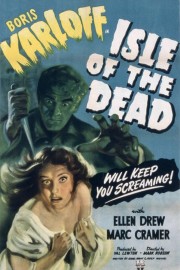Isle of the Dead
Val Lewton’s horror films turned on the simple premise of ordinary people confronted by extraordinary happenings. The American man whose wife fears turning into a cat if she gets too close to him. The young nurse whose views of medicine are rocked by supernatural beliefs of natives. In “Isle of the Dead,” we get a military officer in 1912 Greece who is sharing a secluded house with townspeople, fearful of a plague, or something more, that might overcome them. Lewton’s films feature complex characters who behave as best they know how under the circumstances presented them. At the center of “Isle of the Dead,” we get Boris Karloff’s Gen. Nikolas Pherides. Those who only know Karloff as Universal’s Frankenstein monster would do well to check out his work here and in the Lewton-produced thriller, “Bedlam.” We see different shadings of the actor you don’t really get in that iconic role. Here, he is a button-up officer doing what he has to do, and sometimes, going beyond what he should, for risk of spreading a sickness that has killed those it comes in conflict with. Is it just the plague, though, or is there something more sinister at work? One of the brilliant touches of any Lewton film is that uncertainty lingers, even after the final frame.
In Greece, during the Balkan War in 1912, an scarcely-inhabited island is quarantined for fear of the plague. Among those are Karloff’s Gen. Pherides, who controls the people he is trapped alongside with an iron fist, especially after he finds his wife’s grave open and empty. Paranoia takes hold, and talk of a vampiric creature dominates the thinking as one person after another dies of the plague. One woman shares a nightmare of being buried alive, and after she is found seemingly dead, we find out if that was nightmare or prophecy. The screenplay by Ardel Wray and Josef Mischel, like many Lewton-produced scripts, owes more than a debt to Edgar Allen Poe’s work in its emphasis of atmosphere and psychological terror over violence, and Mark Robson nails that mood beautifully in this film. Once again, the supernatural pervades real-life fears and anxieties in a way that Lewton and his filmmakers were acutely capable of making come to life. Few of Lewton’s productions are genuinely great affairs, but few horror legacies were more capable of getting under viewer’s skin as adeptly as his. The woman who was afraid of being buried alive isn’t the only one left with nightmares once Lewton is done with you.










